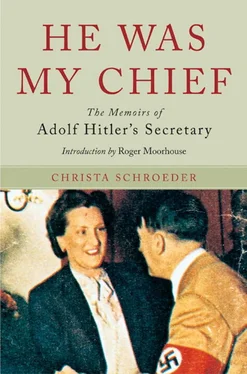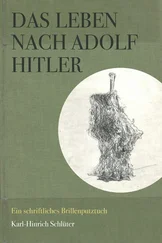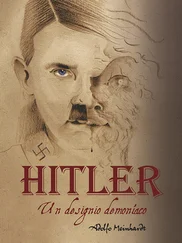Christa Schroeder - He Was My Chief - The Memoirs of Adolf Hitler's Secretary
Здесь есть возможность читать онлайн «Christa Schroeder - He Was My Chief - The Memoirs of Adolf Hitler's Secretary» весь текст электронной книги совершенно бесплатно (целиком полную версию без сокращений). В некоторых случаях можно слушать аудио, скачать через торрент в формате fb2 и присутствует краткое содержание. Город: Barnsley, Год выпуска: 2012, ISBN: 2012, Издательство: Frontline Books, Жанр: История, Биографии и Мемуары, на английском языке. Описание произведения, (предисловие) а так же отзывы посетителей доступны на портале библиотеки ЛибКат.
- Название:He Was My Chief: The Memoirs of Adolf Hitler's Secretary
- Автор:
- Издательство:Frontline Books
- Жанр:
- Год:2012
- Город:Barnsley
- ISBN:978-1-7830-3064-4
- Рейтинг книги:4 / 5. Голосов: 1
-
Избранное:Добавить в избранное
- Отзывы:
-
Ваша оценка:
- 80
- 1
- 2
- 3
- 4
- 5
He Was My Chief: The Memoirs of Adolf Hitler's Secretary: краткое содержание, описание и аннотация
Предлагаем к чтению аннотацию, описание, краткое содержание или предисловие (зависит от того, что написал сам автор книги «He Was My Chief: The Memoirs of Adolf Hitler's Secretary»). Если вы не нашли необходимую информацию о книге — напишите в комментариях, мы постараемся отыскать её.
He Was My Chief: The Memoirs of Adolf Hitler's Secretary — читать онлайн бесплатно полную книгу (весь текст) целиком
Ниже представлен текст книги, разбитый по страницам. Система сохранения места последней прочитанной страницы, позволяет с удобством читать онлайн бесплатно книгу «He Was My Chief: The Memoirs of Adolf Hitler's Secretary», без необходимости каждый раз заново искать на чём Вы остановились. Поставьте закладку, и сможете в любой момент перейти на страницу, на которой закончили чтение.
Интервал:
Закладка:
Now your uncle, whose influence on your mother is well-known, is attempting to manipulate her weakness with unlimited cynicism. Unfortunately we are not able to respond to this repression until you reach your majority . He always puts obstructions in our path to block our mutual happiness although he knows that we are made for each other. The year of separation that your mother has imposed on us will only bind us closer to each other inwardly. As I always make the effort to think and act honestly, I find it difficult to accept the existence of these faults in others. However I can only explain your uncle’s actions as being grounded in selfish motives towards yourself. He simply intends that one day you will belong to nobody but him…
And at another place:
Your uncle continues to see you as the ‘inexperienced child’ and cannot understand that you have matured meanwhile and want to shape your own future. Your uncle has an overbearing personality. In his Party they all cower before him like slaves. I do not understand how, with his keen intelligence, he can deceive himself into believing that his obstinacy and theories about marriage can break our love and determination. He hopes that during this year (of separation) he will change your mind, but how little he knows your soul.
And in that he was surely right, for one day Geli could stand the pressure no longer and shot herself on the day of a quarrel with her uncle.
During internment postwar I got to know Frau Winter. [96] Anni Winter née Schuler (b. 29.2.1905 Pfakofen/Regensburg, d. 17.10.1970 Munich). 1.5.1929 married Georg Winter, a former NCO and manservant to General Epp the Freikorps leader; 1.10.1929◦– May 1945 Hitler’s housekeeper at Prinzregenten-Platz 16/II; 8.6.1945 interned by US Army.
She was discreet and tight-lipped and thus enjoyed Hitler’s confidence during the period between 1929 and 1945 when she was his housekeeper-cook at Prinzregenten-Platz 16/II. What she told me about Geli Raubal, the daughter of Hitler’s half-sister Angela Raubal, I found very interesting. This had nothing to do with any immorality between Hitler and Geli, but of a platonic love saturated with jealousy. According to Frau Winter, Geli, who wanted to study singing, was installed by Hitler in his apartment. He had a room converted for her there. Geli accompanied him everywhere and was the only woman at his side on his visits to the theatre. During the Prinzregenten Theatre festival in early 1930 a beautiful silver-fox fur she was wearing caught my eye.
During the tea hour in the Staircase Room at the Radziwill Palace, Hitler’s thoughts very often turned to Geli, and he needed to speak about her. One inferred distinctly that he was grooming her to be his wife. When concluding some anecdotes about Geli he said once: ‘There was only one woman I would have married!’ and for me the sense of this declaration was unmistakeable. I also understood now why he had watched over the activities of the beloved like a hawk. Frau Winter was firmly convinced that Geli dreamed of marrying her uncle, for no other man was in a position to pamper her permanently in the manner to which she had become accustomed.
After the war the US archives declassified invoices for extravagant purchases of clothing made for Geli, a sure reason why she was prepared to be submissive and allow Hitler to drive off all her other suitors. Frau Winter stated that the circumstances surrounding Geli’s suicide were as follows. Hitler asked Geli, who was visiting her mother at Berchtesgaden, to come to Munich. After her arrival on the morning of 18 September 1931, he had to go into town, but promised to return for lunch. He did not return until four that afternoon, when he informed her that he had to travel immediately to Nuremberg. Geli was upset because she could have stayed with her mother at Berchtesgaden. She asked Hitler for permission to go to Vienna for a vocal test which she had had planned for some time but he refused outright. Thus they parted under a cloud. Geli now went through Hitler’s possessions and found items of correspondence. She told Frau Winter that she was intending to go to the cinema, but instead stayed in her room. When Frau Winter brought her breakfast next morning, there was no answer to her knock. Seeing the key in the lock on the other side of the door she feared the worst and asked her husband to break in. There they found Geli shot dead, lying on a chaise-longue .
After Geli’s death, Hitler was a completely changed man and his supporters feared that he might also take his own life. Heinrich Hoffmann took a close interest in Hitler’s well-being and succeeded in the next few months in bringing Hitler out of his self-imposed isolation. Geli’s suicide hit Hitler hard, and at this point he converted to vegetarianism. [97] According to Schaub’s statement in 1945.
His memory of Geli became a cult for Hitler. Her room at his Munich flat had to remain precisely in the condition it was at the moment of her death. Until the outbreak of war he carried the key to the room on his person, and the room which Geli used to occupy at Haus Wachenfeld remained permanently locked. When the structure was enlarged later into the Berghof, the part where Geli’s room was located was left untouched. All her clothes, toilet items and whatever else had belonged to her remained in their place. He even refused Geli’s mother the return of mementoes or letters.
Towards the end of the war Hitler gave Schaub the job of destroying Geli’s personal effects. Beside the photos there was a bust of her. When I knew all this and that Hitler came between the couple whenever a love relationship threatened to take solid form, and when I heard him say in the Staircase Room: ‘There was only one women I would have married…’ there was no doubt for me but that Geli had been this woman. In the Staircase Room we asked Hitler once: ‘Why have you never married?’ He replied:
I would not have made a good father and I would consider it irresponsible to have founded a family if I had not been able to devote myself sufficiently to the wife. Moreover I do not want children of my own. I find that the descendants of a genius mostly have it very difficult in the world. One expects them to have the same ability as their famous forebear and do not forgive them for being average. Apart from that they mostly turn out cretins.
Hitler appears to have kept his love life platonic throughout, beginning with the blonde Stefanie in Linz, whom he worshipped from afar, then Maria Reiter, Ada Klein, Sigrid von Laffert to the various female theatrical performers and artistes who were invited to be entertained in the Führer-apartment at the Reich Chancellery in the first years after 1933. His admiration for famous actresses and dancers was sincere. At a premiere and on their birthdays he would send valuable presents, and in wartime took great pleasure in having parcels of coffee and food delivered to them, relishing the letters of gratitude they sent him for the gifts. His custom of throwing a brilliant reception for the German art world every year had to be abandoned once war came.
I remember for example the dancers the Höpfner sisters, the film actress Jenny Jugo, Magda Goebbels, her sister-in-law Ello Quandt, Gretl Slezak, Leni Riefenstahl, Unity Mitford and Eva Braun◦– yes, even his relationshiop with Eva Braun was a façade. Hitler’s personal photographer Heinrich Hoffmann was convinced that Hitler had nothing with Eva Braun. [98] Two statements made after the war show unequivocally that Hitler was not the lover of Eva Braun, contrary to assertions in the literature and periodicals. In 1945 Julius Schaub was asked: ‘Did Hitler love Eva Braun?’ Schaub: ‘He liked her.’ Q: ‘What is that supposed to mean? What did you mean when you said in Munich “He liked her.” Did he love her?’ Schaub: ‘He was fond of her.’ In 1945 Heinrich Hoffmann said: ‘From 1930 onwards Hitler often came to my studios and on such occasions took the opportunity to get to know Eva Braun and saw her often. In my opinion Hitler’s relationship with Eva Braun was always platonic.’
He went out with her, but when he began to find less time for her while electioneering she made some sly suicide attempts. These were successful, for Hitler as a politician could not afford a second suicide of a young woman in his close circle. I repeat, the only woman he loved and would later have married was his niece Geli Raubal.
Интервал:
Закладка:
Похожие книги на «He Was My Chief: The Memoirs of Adolf Hitler's Secretary»
Представляем Вашему вниманию похожие книги на «He Was My Chief: The Memoirs of Adolf Hitler's Secretary» списком для выбора. Мы отобрали схожую по названию и смыслу литературу в надежде предоставить читателям больше вариантов отыскать новые, интересные, ещё непрочитанные произведения.
Обсуждение, отзывы о книге «He Was My Chief: The Memoirs of Adolf Hitler's Secretary» и просто собственные мнения читателей. Оставьте ваши комментарии, напишите, что Вы думаете о произведении, его смысле или главных героях. Укажите что конкретно понравилось, а что нет, и почему Вы так считаете.












